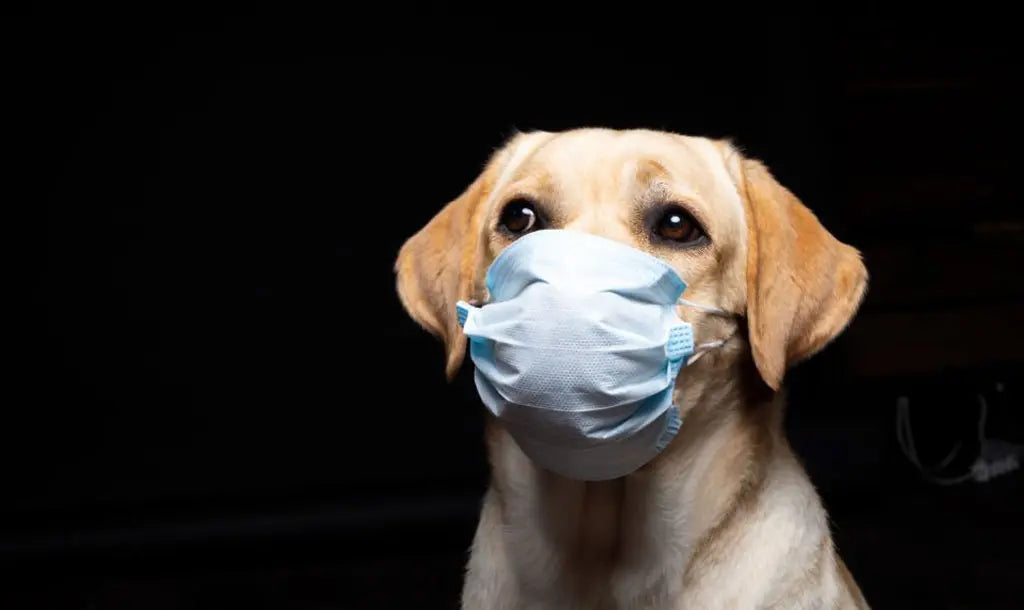If your dog has ever returned from a kennel, daycare, dog park, training facility, or shelter with a loud, hacking cough, chances are it was kennel cough—also known as infectious tracheobronchitis or Bordetella. This upper respiratory condition is not only common but highly contagious, spreading rapidly anywhere dogs gather. Though it can sound alarming, the good news is that most cases are mild and self-limiting in otherwise healthy pets.
As a proactive, integrative veterinarian, my focus is not on suppressing symptoms with unnecessary drugs or recommending repeated vaccinations that may not work. Instead, I advocate for a natural, immune-supportive approach to prevention, early recognition, and gentle care that prioritizes long-term health of your animal companion.
What Exactly Is Kennel Cough?
Kennel cough is a respiratory syndrome—meaning it involves multiple pathogens rather than a single infectious agent. The most common duo behind the condition includes the Bordetella bronchiseptica bacteria and the parainfluenza virus1. However, other viruses can also be involved, including canine adenovirus type 2, canine herpesvirus, reovirus, and even canine distemper.
This co-infection phenomenon is why calling it a “Bordetella infection” is a misnomer. And it’s why the Bordetella vaccine alone often fails to prevent the illness. Kennel cough is better understood as an umbrella term for a complex of infectious agents that inflame the upper airway and cause a characteristic, forceful cough.
How It Spreads and Why It Persists
Dogs catch kennel cough the same way humans catch colds—through airborne respiratory droplets expelled when an infected dog sneezes or coughs. These aerosolized particles can travel several feet and linger in the environment. Direct contact with contaminated surfaces like shared water bowls, toys, or grooming tables also increases transmission.
Most outbreaks occur in environments with many dogs in close quarters: boarding kennels, shelters, training centers, veterinary clinics, and dog shows. Stressors such as travel, temperature swings, dry air, cold drafts, smoke, poor ventilation, or overexertion suppress immune defenses and increase susceptibility.
What many dog parents don’t realize is that an infected dog can remain contagious for 6 to 14 weeks—even after they appear to have recovered. This is one of the reasons why kennel cough continues to circulate, even among vaccinated populations.
Recognizing the Symptoms
The classic sign of kennel cough is a persistent, dry, hacking or “honking” cough. It may sound like your dog has something stuck in their throat. The cough can be triggered by excitement, exercise, or pressure on the trachea (such as when pulling on a collar).
Additional symptoms may include:
- Sneezing
- Nasal discharge
- Gagging or retching
- Mild fever
- Coughing up white foam or phlegm
- Lethargy (in more serious cases)
- Loss of appetite (rare unless secondary infection is present)
Symptoms typically develop within 2 to 14 days after exposure and may last for 10 to 20 days. In some dogs—especially puppies, seniors, or those with underlying immune challenges—symptoms can persist even longer.
While the condition is rarely life-threatening in healthy dogs, it can progress to bronchitis or pneumonia if left unchecked in more vulnerable individuals.
When to Call the Vet
If your dog is eating, drinking, and active but has a dry, non-productive cough, it’s reasonable to monitor at home using natural remedies and supportive care. However, contact your veterinarian if you observe:
- Labored breathing
- High fever
- Persistent lethargy
- Loss of appetite
- Coughing that worsens or becomes wet or productive
Diagnosis is typically based on clinical signs and history of recent exposure. In complex or severe cases, your vet may recommend chest x-rays, blood tests, or cultures to rule out pneumonia or other infections.
Conventional vs. Integrative Treatment
Most cases of kennel cough resolve without the need for prescription medications. In fact, antibiotics are often ineffective because they don’t target the viral component. I typically reserve antibiotics for dogs who are immunocompromised or show signs of secondary bacterial infection (like pneumonia). I’ve found that immediately instituting the nebulization protocol, below, can eliminate the need for oral antibiotics.
I also recommend beginning an integrative protocol that includes immune-boosting support and natural symptom relief. The goal is not just to manage the illness, but to strengthen your dog’s overall vitality.
Natural Remedies I Find Useful
A variety of drug-free treatments—ranging from natural immune modulators and antioxidants to antimicrobial agents and respiratory soothers—can be used to gently support the healing process without relying on suppressive drugs. These therapies work by enhancing immune resilience, calming inflammation, soothing irritated airways, and helping the body clear pathogens more effectively.
When combined thoughtfully (based on your dog’s specific symptoms), they offer a safe and effective approach to managing kennel cough in both acute and lingering cases. Of course, not all of these nutraceuticals are needed in every case, so work with your integrative vet to knit together a protocol based around your pup’s specific symptoms (if you need a vet that does telehealth consults, visit www.CIVTedu.org/directory).
Esberitox™ 2 (Echinacea, Thuja, Wild Indigo Root)
A botanical blend that helps modulate the immune response and shorten the duration of infection.
Vitamin C
Supports immune function and acts as a natural antiviral and antioxidant.
Vitamin E
Protects cellular membranes and helps reduce inflammation during respiratory illness.
Manuka honey
Soothes the throat, calms coughing, and offers natural antimicrobial properties.
Slippery elm bark or marshmallow root
Herbal demulcents that coat and calm irritated throat tissues and upper airways.
Olive leaf extract
Provides antiviral and antibacterial effects, helping to inhibit pathogen replication.
Fresh garlic
Delivers natural antimicrobial benefits and helps stimulate immune activity.
Homeopathic Bordetella nosodes
Energetic remedies that aim to support immune resilience and may help reduce severity and recurrence3.
Quercetin with bromelain
Acts as a natural antihistamine and anti-inflammatory, reducing airway irritation and inflammation.
Beta-glucans from medicinal mushrooms (Reishi, Turkey Tail, Maitake)
Enhance innate immune responses and support immune system balance.
Propolis extract (alcohol-free)
A bee-derived resin with antiviral, antibacterial, and anti-inflammatory properties.
Specialized pro-resolving mediators (SPMs)
Help the body actively resolve inflammation and support tissue healing and immune recovery.
Adaptogens (Astragalus, Rhodiola, Schisandra, Ashwagandha)
Reduce the impact of stress on immune function and enhance recovery from illness.
Omega-3 fatty acids (EPA and DHA)
Help reduce airway inflammation and support overall immune function during respiratory illness.
Nebulization Therapy: Delivering Medicine Right to the Source
For dogs experiencing moderate to severe respiratory infections, a multi-targeted nebulization protocol prescribed by your integrative or functional medicine vet can be incredibly effective in supporting recovery.
This approach combines three powerful agents in one treatment:
N-acetylcysteine (Mucomyst™) to break down mucus and improve airway clearance, glutathione to reduce inflammation and protect the delicate respiratory lining, and colloidal silver to provide broad-spectrum antimicrobial support.
These ingredients are combined and delivered via a standard nebulizer using a pet-friendly mask or enclosed chamber. The mist allows active compounds to reach deep into the airways, offering relief where oral medications often can’t.
This integrative treatment can be administered once or twice daily during the acute phase of illness. The session typically lasts 10 to 20 minutes and should be done in a calm, quiet environment. Consistent use helps soothe irritated airways, promote mucus drainage, and support the body’s natural healing process without the side effects associated with conventional drugs4.
Practical At-Home Tips
- Use a harness: Avoid collars that put pressure on the trachea and trigger coughing fits.
- Humidify the air: Dry air can irritate sensitive respiratory passages. A cool-mist humidifier with a few drops of essential oil can provide relief.
- Isolate infected pets: Prevent the spread to other dogs by keeping your sick dog away from communal areas until fully recovered.
- Limit exertion: Keep your dog calm and quiet during recovery.
- Offer fresh, nutritious meals: A fresh, species-appropriate diet provides the building blocks needed for immune repair.
The Vaccine Controversy
Kennel cough is often referred to as an “unvaccinatable disease” because a single pathogen doesn’t cause it, but rather a complex mix of viruses and bacteria—including Bordetella bronchiseptica, parainfluenza virus, canine adenovirus type 2, and others. The commonly used Bordetella vaccine targets only one of these agents and does not provide sterilizing immunity, meaning vaccinated dogs can still become infected and spread the illness.
As a result, even well-vaccinated dogs may contract kennel cough, especially in high-exposure settings. This multifactorial nature makes complete prevention through vaccination alone unreliable.
Kennel cough vaccines come in three forms: intranasal, oral, and injectable. The intranasal vaccine is administered as drops into the nose and offers the quickest onset of localized immunity in the respiratory tract. The oral vaccine, given by mouth, is also designed to stimulate mucosal immunity and is generally well-tolerated5. The injectable vaccine is given under the skin, and according to immunology professor Dr. Ronald Schultz, is less effective at preventing infection at the respiratory surface, where pathogens first enter. If your boarding facility or vet insists your dog get the vaccine, opt for the oral or intranasal options.
Building a Resilient Immune System
Supporting your dog’s immune system is the most powerful way to prevent kennel cough and other infectious diseases. Here’s how:
- Feed fresh, whole foods: Eliminate highly processed kibble in favor of nutritionally balanced, human-grade fresh food diets rich in antioxidants and omega-3s.
- Minimize toxic load: Avoid lawn chemicals, synthetic air fresheners, chemical home cleaners and overuse of flea and tick chemicals.
- Offer daily immune support: Consider adding medicinal mushrooms, and a source of probiotic supplements or foods.
- Provide environmental enrichment: Chronic stress suppresses immunity. Enrichment, play, and routine reduce stress-induced illness.
A Word About Puppies and Seniors
Very young and elderly dogs are more vulnerable to complications from kennel cough. Their immune systems are either underdeveloped or in decline, and they often have less physiological reserve.
If your puppy or senior dog contracts kennel cough, you may need to support them more aggressively with hydration, rest, targeted supplementation, and antibiotics if pneumonia is occurring.
In Summary
Kennel cough is a nuisance, but not a crisis for most healthy dogs. Like a cold in humans, it’s typically short-lived and self-limiting. The key is to recognize symptoms early, support recovery naturally, and avoid overmedicalizing a condition that doesn’t usually require pharmaceuticals.
If your dog is coughing, don’t panic. Offer rest, keep them comfortable, and give their immune system the tools it needs to respond effectively. Avoid unnecessary Bordetella vaccines and instead focus on long-term prevention through good nutrition, immune resilience, and mindful lifestyle choices.
As always, consult with your integrative veterinarian for individualized advice—and remember: a strong immune system is your dog’s best defense.





